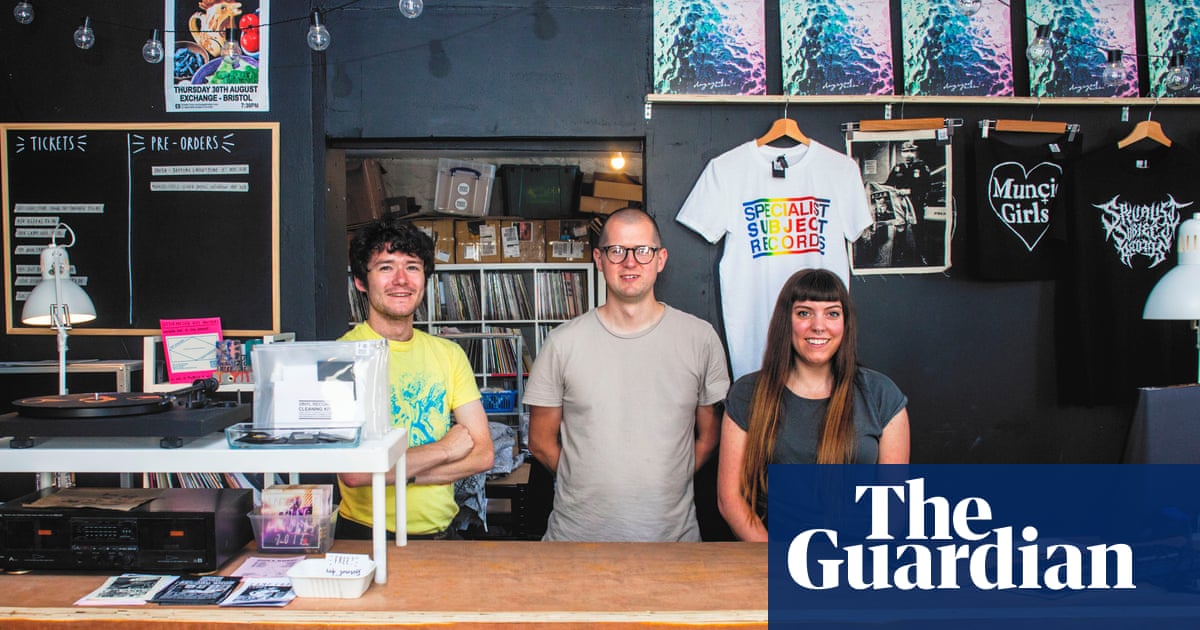
‘We don’t want money going to private landlords’: UK music venues turn to community ownership
Just 24 hours before playing to one of the largest audiences on Earth, Paul McCartney could be found blasting out Hey Jude to a room of just 850 screaming fans in Frome, Somerset. His Glastonbury warmup show took place at the Cheese and Grain, a not-for-profit, member-owned venue.
“He gave a stonkingly wonderful performance,” says venue director Steve Macarthur. “One of his considerations for selecting us was he liked the fact that we were a community-controlled not-for-profit outfit with a commitment to training local people to fill jobs.”
The venue has had this structure for more than 20 years but recently there’s been a surge in venues looking to adopt community business models – be it charitable status social enterprises like the Cheese and Grain or the Tees Music Alliance in Stockton-on-Tees, the Community Interest Company (CIC) model of Birkenhead’s Future Yard, or a Community Benefit Society (CBS) model adopted by venues such as the Exchange in Bristol and The Hive in Cheshire. While these models vary slightly in structure, all are broadly underpinned by placing power and control in the hands of the local community.
“Something radical is happening,” says Mark Davyd, chief executive of the charity Music Venue Trust. “When we started in 2014, 3% of the venues in the country had a not-for-profit structure and it’s now 26%.” A combination of doom and gloom scenarios for venues around noise complaints, rent increases, evictions and redevelopment – plans to turn 6,000-capacity London nightclub Printworks, one of the UK’s most iconic venues, into offices have just been approved – has resulted in many being in precarious situations. More than a third of grassroots venues have closed in the last 20 years, nearly all are tenants (with the average operator only having 18 months left on their tenancy) and even though the Culture Recovery Fund helped some during the pandemic, in 67% of cases the money went to landlords.

MVT has launched Music Venue Properties as a CBS and is currently offering up community shares – members of the public can invest to become part-owners – to help raise £2.5m to buy the freeholds for nine UK grassroots music venues. “Who is the best person to own a venue in order to ensure that it becomes a permanent music space?” asks Davyd. “The community itself. We don’t want money going to private landlords, we want it in the cultural economy because that’s the way we generate more great artists and give more people the opportunity to be involved in music.”
The Ferret, an old school sticky-floor venue in Preston visited by Ed Sheeran and Idles on their way to fame, is being sold and would be a “hammer blow” loss, says Davyd. It’s been deemed an Asset of Community Value by Preston council, creating a six-month window for the community to buy it, which Music Venue Properties will do if its campaign is successful.
Nudge Community Builders, a CBS in Plymouth, has purchased the Millennium building, an old cinema and nightclub, and will turn it into a music venue, “a brilliant vehicle to lock in an asset for the community”, says co-director Wendy Hart. “Then local communities can imagine themselves getting jobs there, they can imagine their kids performing there; people are empowered to really dream differently. We want to harness people’s excitement, because it’s not our journey, it’s everyone’s journey – everyone can have a piece of it.”
Venue operators feel little incentive to invest in a rented building when all that will do is increase its value and make it a more appealing selling prospect for landlords. Community business models, though, open venues up to funding and grants they wouldn’t have access to as a limited company, and because they must use their assets for the benefit of the community it can actually accelerate improvements to infrastructure.
“It revolutionised things for us,” says Matthew Otridge of Bristol’s Exchange, which adopted the CBS model in 2018 and has more than 400 community investors. “We can look at things in terms of decades whereas most venues can only look at things in terms of years.” The money raised from community shares and grants has allowed the venue to put in a second stage, new air ventilation and build accessible toilets.
When Sister Midnight had to leave Deptford location, it established a CBS and raised nearly £300,000 in community shares to take over the Ravensbourne Arms in Lewisham to create an “accessible, affordable and inclusive” venue and pub. That purchase fell through but it is currently close to finalising negotiations to take over another nearby venue, with unanimous support from those who invested in the Ravensbourne Arms purchase.

So what’s driving this shift? “People don’t know about the models, they aren’t taught,” says Sister Midnight’s co-founding director Lenny Watson. “It’s a growing movement as more people are finding out about these democratic ways of working.” In times of a spiralling cost of living crisis they are also desperately needed, Watson feels. “Building wealth in communities is vital: there is such a clear need to redistribute wealth and power and this is a business model that does exactly that.” Macarthur adds: “If you’ve got an asset, sweat it; if you’ve got something which is useful to the local community then let the local community use it.”
Independent Venue Week is also tapping into the potential of music venues as thriving community hubs, by launching a new initiative, Independent Venue Community, which will encourage hundreds of small venues around the UK to open their doors in the daytime to host community programmes.
Education, training, apprenticeships and access to an industry that may feel out of reach for people are often key priorities for these community venues, with places like Future Yard and the Cheese and Grain training young people in everything from sound engineering to marketing. “We’re trying to create jobs for local people,” says Macarthur. “Our objectives are to make life better and to improve life chances for as many people in Frome as we can.”
The hope is this creates a mutually supportive loop. “There’s a pride in ownership,” says Otridge. “Our stakeholders feel like they have a part in the success of the venue, so they get involved by coming to more gigs, or telling friends about gigs. We utilise their skills and expertise too, from accountancy advice to cheap building supplies. All this makes the running of the venue a lot more efficient.”
For Davyd though, the successful end point of all of this is when his job no longer exists. “All good charities should plan for their own extinction,” he says. “So, let’s actually sort out the problem rather than keep sticking plasters over it. This is an incredibly strong model that really could make a big difference.”












